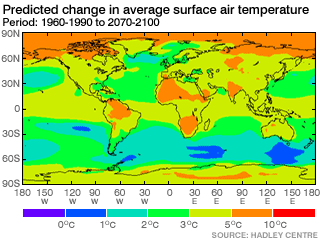Novo estudo indica que o planeta está a caminho de ficar 6º C mais quente

Novos dados sobre as emissões mundiais de CO2 (dióxido de carbono, principal gás causador do efeito estufa) indicam que o planeta está a caminho de esquentar 6 graus Celsius neste século, se não houver um esforço concentrado para diminuir a queima de combustíveis fósseis.
“Existe um abismo claro entre o caminho que estamos seguindo e o que é necessário para limitar o aquecimento global a 2 graus Celsius [nível considerado relativamente seguro por especialistas]”, diz Corinne Le Quéré, pesquisadora da Universidade de East Anglia (Reino Unido) e coautora do novo estudo [Trends in the sources and sinks of carbon dioxide Trends in the sources and sinks of carbon dioxide] na revista científica “Nature Geoscience”. Reportagem da Folha de S. Paulo, com agências internacionais e informações complementares do EcoDebate.
Na atual década, a principal responsável por puxar para cima as emissões é a China, com seu crescimento industrial alimentado pelo carvão mineral. Hoje, o país é o maior emissor do planeta.
No entanto, os EUA ainda respondem pelas maiores emissões per capita: 18 toneladas, contra 5,2 toneladas dos chineses (a média mundial é de 4,8 toneladas).
Desde 1982, a humanidade produziu 715,3 trilhões de toneladas de gás carbônico, quantidade que equivale ao total de dióxido de carbono emitido por todas as civilizações que existiram no mundo antes disso.
Trends in the sources and sinks of carbon dioxide
Corinne Le Quéré, Michael R. Raupach, Josep G. Canadell, Gregg Marland et al.
Published online: 17 November 2009 | doi:10.1038/ngeo689
Efforts to control climate change require the stabilization of atmospheric carbon dioxide concentrations. An assessment of the trends in sources and sinks of atmospheric carbon dioxide suggests that the sinks are not keeping up with the increase in carbon dioxide emissions, but uncertainties are still large.
Abstract
Efforts to control climate change require the stabilization of atmospheric CO2 concentrations. This can only be achieved through a drastic reduction of global CO2 emissions. Yet fossil fuel emissions increased by 29% between 2000 and 2008, in conjunction with increased contributions from emerging economies, from the production and international trade of goods and services, and from the use of coal as a fuel source. In contrast, emissions from land-use changes were nearly constant. Between 1959 and 2008, 43% of each year’s CO2 emissions remained in the atmosphere on average; the rest was absorbed by carbon sinks on land and in the oceans. In the past 50 years, the fraction of CO2 emissions that remains in the atmosphere each year has likely increased, from about 40% to 45%, and models suggest that this trend was caused by a decrease in the uptake of CO2 by the carbon sinks in response to climate change and variability. Changes in the CO2 sinks are highly uncertain, but they could have a significant influence on future atmospheric CO2 levels. It is therefore crucial to reduce the uncertainties.
EcoDebate, 19/11/2009
Inclusão na lista de distribuição do Boletim Diário do Portal EcoDebate
Caso queira ser incluído(a) na lista de distribuição de nosso boletim diário, basta utilizar o formulário abaixo. O seu e-mail será incluído e você receberá uma mensagem solicitando que confirme a inscrição.
 |
| Participe do grupo Boletim diário EcoDebate |
| Visitar este grupo |
Fechado para comentários.